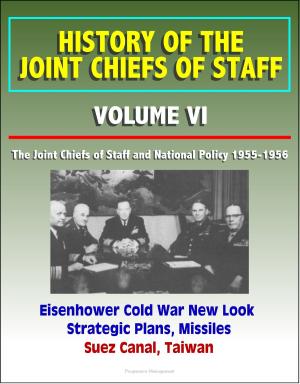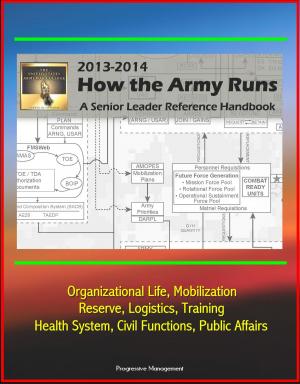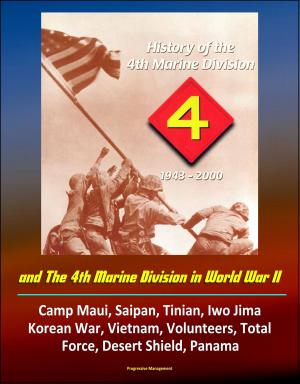History of the Office of the Secretary of Defense, Volume Two: The Test of War, 1950-1953 - Pentagon's Role in the Korean War, the Recall of MacArthur, Hydrogen Bomb, Truman, NATO
Nonfiction, History, Asian, Korean War, Military, United States| Author: | Progressive Management | ISBN: | 9781301537723 |
| Publisher: | Progressive Management | Publication: | July 7, 2013 |
| Imprint: | Smashwords Edition | Language: | English |
| Author: | Progressive Management |
| ISBN: | 9781301537723 |
| Publisher: | Progressive Management |
| Publication: | July 7, 2013 |
| Imprint: | Smashwords Edition |
| Language: | English |
The Test of War, the second volume in the comprehensive History of the Office of the Secretary of Defense, follows the evolution of OSD from the outbreak of the Korean War in June 1950 to the end of the Truman presidency in January 1953. Like the first volume in the series (The Formative Years, 1947-1950), the present one focuses on the secretaries of defense, their staffs, and OSD's administration of the Pentagon and examines, beyond OSD and the Department of Defense, the larger framework of national security organization and policy that involved the White House, Congress, and other agencies of the government. As the central event of this period, the Korean War tested the mettle of officials and institutions throughout the national security establishment, but nowhere more acutely than in the E-ring offices of the Pentagon leadership. The Korean-era secretaries of defense—Louis Johnson. George Marshall, and Robert Lovett—confronted a maze of problems relating to strategy, budgets, manpower, weapons development, and service roles and missions. Operating under wartime pressures while attempting to manage a department on-lv recently created and still undergoing major adjustments, they faced a formidable agenda made even more difficult by domestic political and economic constraints that narrowed the options available to them. In a narrative rich in both documentary-detail and broad-brush perspective, The Test of War assesses how well the secretaries met these challenges. Success or failure depended not only on their effectiveness in managing the Pentagon bureaucracy, in particular their interaction with the Joint Chiefs of Staff and the still parochial-minded military services, but also on their relationship with Truman, Secretary of State Dean Acheson. and a contentious Congress unhappy over the firing of MacArthur, the pace of mobilization, and the progress of the war generally.
Korea, of course, was the flash point for a much wider struggle unfolding during this time, the effort by the United States to contain the expansionist activities of the Soviet Union and communism. As the conflict in the Far East dragged on seemingly indefinitely, officials in Washington turned their attention increasingly to Europe and the strengthening of the Western alliance. Much of the book deals with the shaping of NATO and the related subject of military assistance.
In a thoughtful conclusion, The Test of War observes that the precedents established in these seminal years—the beginnings of a military-industrial complex, the changing strategic formulations that allowed for reliance on nuclear as well as conventional weapons, the sharp debate over European vs. Asian priorities, and, above all, the staunch and expensive commitment to containment—would influence national security policy and the U.S. defense effort for the remainder of the century.
I. Prelude to War * II. The Role of the Pentagon * III. The North Korean Attack * A Divided Korea * Combating Aggression * The United Nations Command * Finding U.S. Troops for Korea * Defeat of the North Koreans * IV. The Chinese Entry into the War * Early Views of Chinese Intentions * The Northern Borders * Enemy Sanctuary and MacArthur's Mission * Continuing the UN Ground Offensive * Response to Defeat * The Question of a Cease-Fire * V. A Policy of Limited War * A New Toughness * Across the 38th Again * Recall of MacArthur * Ridgway and Military Policy * VI. Fighting But Talking * The Start of the Talks: An Agenda * A Military Demarcation Line * Ground Operations * A Challenge to Air Superiority * VII. The Prisoners of War * The Major Issue—Repatriation * Recessing the Negotiations * VIII. The Final Round * The Protracted War * The Ammunition Problem * IX. Formosa: A Reversal of Policy * Neutralization and Assistance * Effects of the Chinese Intervention in Korea * X. Japan: A New Relationship
The Test of War, the second volume in the comprehensive History of the Office of the Secretary of Defense, follows the evolution of OSD from the outbreak of the Korean War in June 1950 to the end of the Truman presidency in January 1953. Like the first volume in the series (The Formative Years, 1947-1950), the present one focuses on the secretaries of defense, their staffs, and OSD's administration of the Pentagon and examines, beyond OSD and the Department of Defense, the larger framework of national security organization and policy that involved the White House, Congress, and other agencies of the government. As the central event of this period, the Korean War tested the mettle of officials and institutions throughout the national security establishment, but nowhere more acutely than in the E-ring offices of the Pentagon leadership. The Korean-era secretaries of defense—Louis Johnson. George Marshall, and Robert Lovett—confronted a maze of problems relating to strategy, budgets, manpower, weapons development, and service roles and missions. Operating under wartime pressures while attempting to manage a department on-lv recently created and still undergoing major adjustments, they faced a formidable agenda made even more difficult by domestic political and economic constraints that narrowed the options available to them. In a narrative rich in both documentary-detail and broad-brush perspective, The Test of War assesses how well the secretaries met these challenges. Success or failure depended not only on their effectiveness in managing the Pentagon bureaucracy, in particular their interaction with the Joint Chiefs of Staff and the still parochial-minded military services, but also on their relationship with Truman, Secretary of State Dean Acheson. and a contentious Congress unhappy over the firing of MacArthur, the pace of mobilization, and the progress of the war generally.
Korea, of course, was the flash point for a much wider struggle unfolding during this time, the effort by the United States to contain the expansionist activities of the Soviet Union and communism. As the conflict in the Far East dragged on seemingly indefinitely, officials in Washington turned their attention increasingly to Europe and the strengthening of the Western alliance. Much of the book deals with the shaping of NATO and the related subject of military assistance.
In a thoughtful conclusion, The Test of War observes that the precedents established in these seminal years—the beginnings of a military-industrial complex, the changing strategic formulations that allowed for reliance on nuclear as well as conventional weapons, the sharp debate over European vs. Asian priorities, and, above all, the staunch and expensive commitment to containment—would influence national security policy and the U.S. defense effort for the remainder of the century.
I. Prelude to War * II. The Role of the Pentagon * III. The North Korean Attack * A Divided Korea * Combating Aggression * The United Nations Command * Finding U.S. Troops for Korea * Defeat of the North Koreans * IV. The Chinese Entry into the War * Early Views of Chinese Intentions * The Northern Borders * Enemy Sanctuary and MacArthur's Mission * Continuing the UN Ground Offensive * Response to Defeat * The Question of a Cease-Fire * V. A Policy of Limited War * A New Toughness * Across the 38th Again * Recall of MacArthur * Ridgway and Military Policy * VI. Fighting But Talking * The Start of the Talks: An Agenda * A Military Demarcation Line * Ground Operations * A Challenge to Air Superiority * VII. The Prisoners of War * The Major Issue—Repatriation * Recessing the Negotiations * VIII. The Final Round * The Protracted War * The Ammunition Problem * IX. Formosa: A Reversal of Policy * Neutralization and Assistance * Effects of the Chinese Intervention in Korea * X. Japan: A New Relationship















